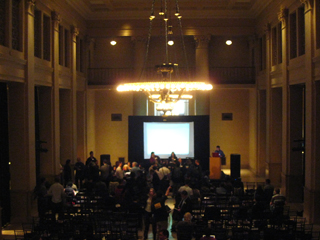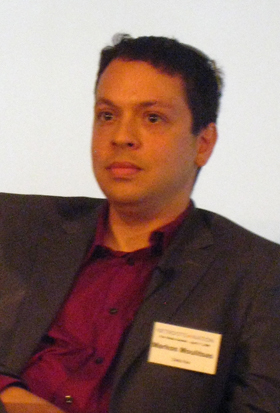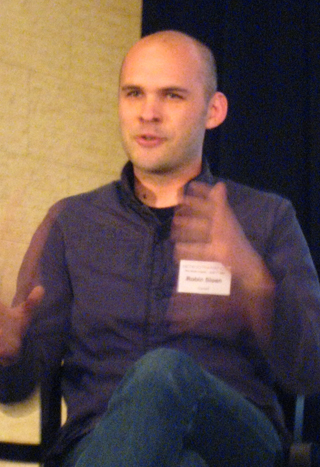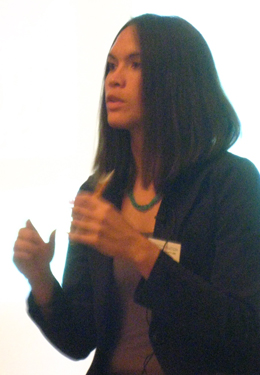SAN FRANCISCO — I am in the swanky Bently Reserve building in downtown San Francisco for the Netroots Nation’s New Media Summit, affliated with the liberal blog Daily Kos. On the agenda today are panels on the evolution of journalism and new media, the wisdom of crowds, social media for social good, and using video to expand your audience. Plus, House Speaker Nancy Pelosi (D-Calif.) will be giving opening remarks. Be sure to refresh this web page to get updates throughout the day.
First up is Pelosi and a panel called “The Evolution of Journalism,” which includes Markos Moulitsas, Daily Kos; Tim Dickinson, Rolling Stone; Karl Frisch, Media Matters for America; Clara Jeffery, Mother Jones; Robin Sloan, Current TV; and new media research consultant Lynn Gutstadt as moderator.
Nancy Pelosi: I’m really pleased with what we’ve accomplished in the last 3 months, and thanks for all your help. We have accomplished a lot, with bills that have brought more jobs for America. The legislation for education was stronger and had more investment in education had more money for education than at any time in history. Same with the health care and energy portions of the budget. More than ever, but in a new direction for our country. I could talk all day about these issues, but our president said we need swift bold action now, and that’s what we need.
With your help, we could have affordable health care for all Americans in the months ahead. [applause] The budget had three pillars: education, health care and energy. And there’s deficit reduction and helping the economy. The leverage has changed. We’re going to get the priorities established and make a difference.

I want to salute Raven Brooks. I just hit your laptop so I’m not sure what’s going to come up. [laughter] At one point Al Gore challenged us to high standards in energy conservation. This New Media Summit is very important in our democracy and for transparency, and you can see what’s happening at Recovery.org. We also want answers as to why we’ve had a Wall Street collapse.
If we’re going to go forward with new leverage and new dreams, it’s important we aren’t hindered by past mistakes, so they can be avoided in the future. It’s an exciting time for us now. Thanks for all you’ve done. I appreciate your support for the status quo. It’s important for all of us to take risks and recognize the leverage has changed. What I like is that with our new president we will deliver what we promise with health care for all Americans.
Evolution of Journalism
After Pelosi got the crowd warmed up, the first panel is starting and will be covering the way that journalism is changing due to new media. Moderator Lynn Gutstadt is introducing the panelists, including folks from Current TV, Mother Jones, Rolling Stone and of course Markos, the namesake of Daily Kos.
Gutstadt: Journalism is going through a lot of pain, and traditional media is struggling and blogs are gaining readership. What’s been happening? We might not know but we can talk about it.
Karl Frisch from Media Matters plays a collage video of all the cable TV discussions that distort the facts about Hillary Clinton, Barack Obama, along with the times they mention and demean Media Matters itself.
Frisch: That’s just a precursor to where we are now. If you’ve watched the news lately there’s been an “ism” arms race — communism, fascism, Leninism. Any discussion about the media and where it’s going cannot be complete without looking at where the media is now, and that’s what Media Matters is doing. We monitor conservative radio, TV and we are a resource for people in online media and traditional media.
[Frisch explains how Media Matters took more action than the NY Times on a story about cable TV “experts” briefed by the Pentagon:]
Robin Sloan: I run strategy at Current and Current TV and used to work at the Poynter Institute, which is a temple to those ideas about journalism. I came to Current in its very early stage. That clip shows how terrible cable TV news is and that’s why Al Gore believed it was ripe for reinvention. Current uses crowdsourcing and citizen journalism but it’s no way inconsistent with the values from the Poynter Institute. We should think about journalism as not being something we hoard.
Clara Jeffery, Mother Jones: We are a traditional media outlet, a print magazine, and we have a lot of bloggers such as David Corn and Kevin Drum. We get money from philanthropies big and small. What’s interesting about print/web hybrids is that the bulk of revenues comes from print — subscribers and ads — and that pays for investigative journalism. But we’re in a quandary because the web alone can’t pay for everything we do. Plus it doesn’t have the right platform for doing long investigative reports.
What I’m worried about is the loss of coverage of local politics, board meetings, and only a few newspapers have a sustained presence in Iraq. There are some bloggers there and freelancers but they can’t tell the story the same way that a large news organization can. I’m not convinced that the decentralized model can work, and provide all the resources for copy editing and fact checking.
Tim Dickinson, Rolling Stone: We are very strong as a print magazine and is one of the few family-owned magazines left. Part of the problem with journalism is the change of ownership from families running them to corporate ownership, who strips the newspapers and magazines and doesn’t treat them right. Rolling Stone isn’t an innovator online but we have strong traffic and we can inject ourselves into the national conversation more, which is exciting. I disagree with you, Clara, on investigative journalism, because I had a piece about John McCain that had an impact online and was picked up by mainstream media, and entered the zeitgeist in ways that it couldn’t before.
There are ecologies that still make money in journalism. Amid all the doom and gloom about journalism, it’s important to know that there are some outlets that are doing well. It’s about synthesis and collecting all this information, and having a handheld device that you can read on the toilet.
Markos Moulitsas, Daily Kos: I think we’ve proven that you don’t even need to be paid to do good journalism. I disagree about the need for professional journalists. We don’t need a reporter to tell us what Pelosi said, you all pulled out your phones and Twittered it. You have people writing about things because they are passionate about it. We have a diarist on Daily Kos who writes about food policy and we don’t pay her, she does it because she’s passionate and she does an amazing job.

If you get people who only focus on one topic, they know things better than any reporter covering that beat. We’re seeing the rise of people-powered media, and it’s not geographically limited. When the terrorist bombing happened in India, I didn’t go to the NY Times, I went to the Times of India. I think foreign correspondents are a waste of money, we can go directly to the local news online if we want.
Kos: Niche is important. We had a metro daily and covered so much, but when a niche site can cover just one topic they don’t have as much overhead. You have media companies owning the Boston Red Sox or Chicago Cubs and big buildings.
Frisch, Media Matters: There will be room for amateurs and professionals, thought the pros might not make as much money as they used to make. Even blogs weren’t the same before when we didn’t know who made the comments. Now they’ve evolved too.
Sloan, Current TV: There are new jobs now, community managers at Current, that we didn’t have before. There’s a lot of talk about jobs going away but there are also new ones cropping up. That’s exciting.
Jeffery, Mother Jones: I think it’s a little bit worrisome when we say that a job that used to have pay is now not being paid and they don’t get health care. Most people who work at the average paper doesn’t get paid very much. They are workers who work had and deserve a good salary. They might become video producers or whatever, but what you have are people at new media companies making money on free labor.

Kos, Daily Kos: My fealty is to information no matter where it came from. What’s important is getting that information even if it’s from Sunlight Foundation or somewhere else. I don’t like people getting laid off, but it’s not my job to worry about that. The big thing that people complain about are links, all these news organizations are complaining about links to stories.
Jeffery, Mother Jones: That’s not what they’re complaining about, it’s about short versions and making summaries of stories.
Kos, Daily Kos: Everyone complains about that but no one has sued over it because they are worried about losing and establishing it as “fair use.”
Dickinson, Rolling Stone: I think Craig from Craigslist should monetize his site and take the money and give it to investigative journalism.
Sloan, Current TV: I think there are some amazing sites that give you important information, like the Washington Independent and EveryBlock. It doesn’t have to be really long investigative pieces. Sometimes it’s the simple boring things that people want.
Q: What about Jeffery’s question to you, Markos, about diarists not getting paid for the writing they do for Kos?
[Here’s a video I shot on my Flip camera of Kos’s response, detailed somewhat below in text:]
Kos, Daily Kos: I provide a big soapbox for people to talk to a huge audience and that’s something that NBC, ABC, no network provides that. Profits? I should get a piece of what Nate Silver has made after he got a start on Daily Kos.
Q: What about people in rural areas who don’t have access to broadband or computers? Shouldn’t we push for universal access to broadband. All of us in this room are wired and tapped in and we shouldn’t leave those people out.
Dickinson: The incoming FCC chair is really interested in this problem and the current administration takes that very seriously.
Q: How can we replace beat reporters who cover small beats on the local level?
Frisch: If you look at most newspapers that have Congress beat reporters, they used to have many beat reporters to cover all the different subjects. But now there’s just one beat reporter for Congress who covers whatever scandal or hot subject is happening.
Kos: The Oakland Tribune is a piece of crap, but Better Oakland is fantastic and they cover every board meeting. You know there’s a person who cares like crazy about every board. There’s a guy on my block that is really into zoning, and he really cares about it, and he might not get paid but he’s passionate about it.
In the past you had to find the right reporter to cover something happening. But now there are so many more people who can cover it, and there are people who can work on that.
*****
I talked with Markos outside the hall between panels. He agreed that the pro vs. amateur argument that broke out during the session was a false choice and an old battle. But he said he didn’t want to back off the statement that only professional journalists can do certain kinds of reporting. He emphasized that there are already amateurs and passionate people without journalism training who were doing reporting online.
How to Socialize Your Video
The next breakout session was about social video and getting your video to a big audience online. Participants include Olivia Ma from YouTube, Hooman Khalili from Alice 97 radio, and social media strategist David Peck. They first discussed a video that Khalili made about the election that received more than 5 million views on YouTube:
Olivia Ma talks about the YouTube ad for Charity:Water that was put on video overlays, and raised $12,000 in one day from donations:
Olivia Ma talks about all the editors at YouTube, and says she oversees news and politics vertical. She says that editors are looking around the site for videos to feature, and then the algorithm helps people find relevant videos. She notes that the “Related Videos” that run below the video you are watching actually drive the most traffic to videos. Metadata is very important — key words and search are important, so tags can help bring your video up for interested viewers.

Hooman: Keep videos short and sweet. There are always exceptions to the rule like the Will.i.am video that was more than 4 minutes. The shorter, the better, but you have to allow time for something to happen.
David Peck: What is your call to action? That’s important. A video needs to make you have two emotions: either angry or sad or makes you want to do something.
Olivia Ma: There’s a tool on YouTube called Insight that lets you see who is viewing the video, and a new feature that shows when people drop out of watching the video. If 50% of people dropped off after 30 second then that’s important to know.
David Peck: Yes, you should use video, but support them with a Facebook page or a cause page, because it will help you get people to take action.
Note: If you want to follow more nuggets from the New Media Summit, check out my Twitter feed here or the hashtag #nms on Twitter search.

I believe Twitter may be only a flash-fad. The Self-Important, spending their day providing minute-to-minute updates to those with no lives… ;^)
— found a cool site; Balkingpoints ; incredible satellite view of earth
Youtube is one the good site in sharing videos and not only that, promoting your site using your own video and uploading it in youtube it gives you a good backlink.
Cebu Hotel